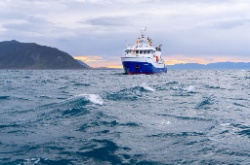Is The Treasury Out Of Control? Will Their Advice Have Serious Ramifications For New Zealand Business?
Monday 26th August 2024
The central plateau’s Ruapehu district is reeling as Winstone Pulp International considers closing its two processing plants in the central North Island. One is at Karioi and the other at Tangiwai. At the same time Pan Pac at Whirinaki near Napier and OJI Fibre Solutions Mill in Penrose are also considering their futures, but why? Because of a pricing system in the electricity market!
National coordinator of TRAC Niall Robertson asks why one industry seems to prosper by putting its customers out of business? Robertson adds, “It’s not just these mills! There are rail and road transport companies affected too. Then there are the ports where these export products are pivotal parts of the port’s business. There is also the potential loss of earnings from the exported products which affects us all.”
TRAC chair Guy Wellwood, who lives in the Hawkes Bay, says, “Soon we will be left with little more than logs to sell, but many of them are being taken through foreign pension investment funds anyway, and they are buying the land for forests to be locked up as carbon sinks!”
Robertson asks, “Why does everything need to be so cut throat? Where is the coordination of our economy? Why do we seem to make so many seemingly crazy decisions which make little sense?”
The pulp train from Karioi and Tangiwai with export freight heading to Napier Port. Photo: Niall Robertson
Robertson points to the recent iReX rail ferry decision for $3 billion and suggests that this could have been reviewed to see how the costs could have been reduced, but wasn’t!”. Robertson adds, “However, at $3 billion it has to be compared to the interest deductibility that was given to landlords at a cost of $2.9 billion every year. One real estate agent said recently that New Zealand doesn’t have an economy, it has a real estate industry”
In the case of the iReX project, during the previous government; it has become clear through OIA information releases, that the Treasury stance was negative from the moment it became clear that KiwiRail wanted rail-enabled ships. That Treasury position was not supported by any internationally credible rail-ferry project value-engineering advice. Neither did Treasury’s position take account of the very long-term nature of the project rate of return, especially for the land-based infrastructure. Rather, the Treasury position was to obturate and delay, throwing sufficient doubt in the minds of the cabinet at the time, to ensure the outcome Treasury wanted.
Thirty years ago the New Zealand economy was transforming into the neo-liberal free market economy that we are so familiar with, but TRAC asks, has this form of economy had its day? Robertson says, “The Maynard Keynes economic theory worked well for a few decades, until the West experienced the stagflation of the 1970’s. That pushed economists into supporting Milton Friedman’s form of free market economics which reinvigorated the economy at the time.” Robertson questions the use of this theory now, as it has become “almost a religion in New Zealand”, especially with centrist and right leaning governments and the Treasury.
Robertson says, “This is quite evident when one looks at how Treasury advises the government regarding electricity generation and transport policy, which appear to be ideologically driven with direct reference to Friedman economics” Robertson adds, “The rail ferry decision was ideological, but was impractical and foolish and will cost the New Zealand economy a lot if non-rail capable ferries are bought instead”. Guy Wellwood agrees and says that the government’s position statement on transport wants to curtail funding for rail by 94%, which he adds, “...is madness!”
Robertson says that a large proportion of the economists in Treasury graduated from the New Zealand School of Economics which has been teaching free market economics since the 1970’s and many in the Treasury are part of an economic think silo and need to be challenged now that there are a number of distortions occurring in the economy leading to many negative outcomes. Robertson says they can be read like a shopping list, such as; “too much foreign ownership such as banks, forestry, farms and processing plants, expensive housing, increased homelessness, low wages, too many skills emigrating, poor health services, lower standards of education, a huge infrastructure deficit and a significant lack of local wealth for productive investment, meaning more foreign capital comes in and profits are exported’.
TRAC is not going to campaign on a lot on many of the items in the above list, but we are outraged that ideology from the Treasury and the current government has led the both of them to make very foolish decisions regarding the future of rail transport in New Zealand which will have serious ramifications for New Zealand businesses and the New Zealand economy and we believe that this will become clearer in time.
 Celebrating 25 Years of Scoop
Celebrating 25 Years of Scoop


 Commerce Commission: Court Confirms TSB Charged Over $3 Million In “Unreasonable” Fees
Commerce Commission: Court Confirms TSB Charged Over $3 Million In “Unreasonable” Fees Vegetables New Zealand: Unfair Industrial Allocations Could Mean The End For Greenhouse Growing In NZ
Vegetables New Zealand: Unfair Industrial Allocations Could Mean The End For Greenhouse Growing In NZ NIWA: New Vessel To Study Undersea In The Hauraki Gulf
NIWA: New Vessel To Study Undersea In The Hauraki Gulf Air New Zealand: Dreams Take Flight - The Special Reason An Air New Zealand Boeing 787-9 Took A Scenic Spin Around The South Island
Air New Zealand: Dreams Take Flight - The Special Reason An Air New Zealand Boeing 787-9 Took A Scenic Spin Around The South Island Lincoln University: Psyllid Peril To Potato Prosperity - Lincoln University Research Saves A Canterbury Crop Crisis
Lincoln University: Psyllid Peril To Potato Prosperity - Lincoln University Research Saves A Canterbury Crop Crisis Biosecurity NZ: Biosecurity New Zealand Temporarily Suspends All Australian Imported Tomatoes
Biosecurity NZ: Biosecurity New Zealand Temporarily Suspends All Australian Imported Tomatoes



